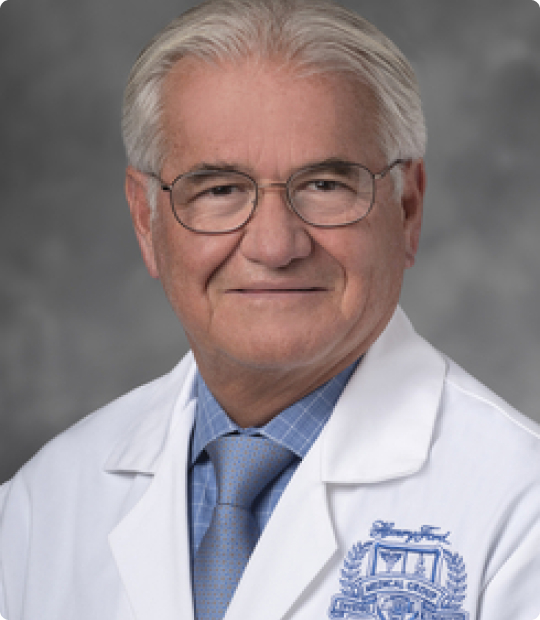
|
William W. O’Neill, MDCertificationsMedical Director, Center for Structural Heart Disease University / Hospital AffiliationHenry Ford Hospital AboutDr. O’Neill, is an internationally recognized leader in Interventional Cardiology and Structural Heart Disease, as well as a pioneer in research and new techniques to diagnose and treat heart disease.
Dr. O’Neill is one of the few Master Fellows out of 4,500 world-wide members of the Society for Cardiovascular Angiography and Interventions (MSCAI), the professional medical society for invasive and interventional cardiologists. He pioneered the use of angioplasty for treatment of heart attacks, which is now the mainstay therapy throughout the world. He has been working on new catheter-based treatments of structural heart disease, and performed the first transcaval aortic valve replacement (TAVR) through a catheter in the U.S. in 2005. Currently he is organizing new protocols to treat a deadly side-effect of massive heart attacks, known as the National Cardiogenic Shock Initiative (NCSI). This initiative has proven to increase patient survival rates from 50% to 76%.
A leader in academic and teaching hospitals for nearly 30 years, and to date, an author of more than 300 hundred peer-reviewed articles and abstracts published in medical literature, Dr. O’Neill has written multiple book chapters, and edited one of the first textbooks in the field of interventional cardiologists. He was a founding member of the American Board of Internal Medicine interventional cardiology board, which certifies all interventional cardiologists.
|
Related Content
 Debatevideo Debate #1 – Unloading and Venting VA-ECMO CGS Patients:...Moderators: Prof. Dr. Med. Patrick Hunziker (University Hospital Basel, Switzerland) and Nir Uriel, MD (Colmbia University Irving... |  video CMR-derived Infarct Size on LV Remodeling: the Roll-in DTU...William O'Neill, MD (Henry Ford Hospital) presents Impact of CMR-derived Infarct Size on LV Remodeling: the Roll-in DTU Experience at... |  video Dr. Bill O’Neill, Henry Ford HospitalDr. O’Neill speaking on the improved survival of AMI cardiogenic shock patients in the National Cardiogenic Shock Initiative resulting... |
Manuscripts & Publications
Transfemoral Tricuspid Valve Replacement in Patients With Tricuspid Regurgitation: TRISCEND Study 30-Day ResultsThe TRISCEND study (Edwards EVOQUE Tricuspid Valve Replacement: Investigation of Safety and Clinical Efficacy after Replacement of Tricuspid Valve with Transcatheter Device) is evaluating the safety and performance of transfemoral transcatheter tricuspid valve replacement in patients with clinically significant tricuspid regurgitation (TR) and elevated surgical risk.
|
|
Complete Hemodynamic Profiling With Pulmonary Artery Catheters in Cardiogenic Shock Is Associated With Lower In-Hospital MortalityThe purpose of this study was to investigate the association between obtaining hemodynamic data from early pulmonary artery catheter (PAC) placement and outcomes in cardiogenic shock (CS).
|
|
Predictors of Device-Related Thrombus Following Percutaneous Left Atrial Appendage OcclusionDevice-related thrombus (DRT) has been considered an Achilles’ heel of left atrial appendage occlusion (LAAO). However, data on DRT prediction remain limited.
|